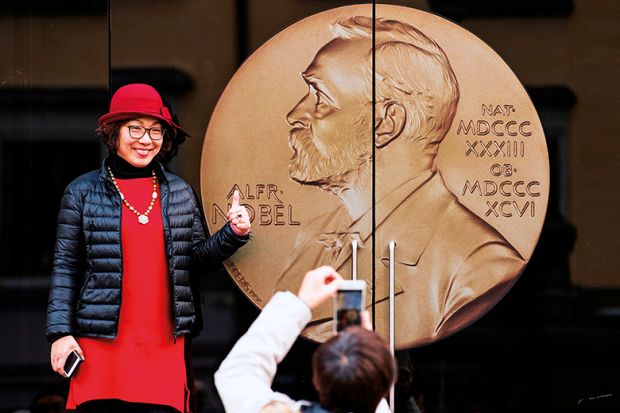China is ramping up its efforts to poach Nobel laureates from universities around the world to establish laboratories in the country, but questions have been asked whether the flagship initiative will have a trickle-down effect that boosts basic scientific research.
After several cities across China embraced the idea, it received a major boost when Beijing – the capital – said it would start recruiting laureates to run laboratories and innovation centres. The scheme is a key plank of the city’s next five-year plan, which was passed on 27 February, and it might encourage other provinces to follow suit.
Beijing may be hoping to emulate the success of the south-eastern city of Shenzhen, which since 2016 has built 11 Nobel laureate labs in partnership with universities and companies, including the Grubbs Institute, named after the chemist Robert Grubbs and hosted by the Southern University of Science and Technology (SUSTech), and the Warshel Institute for Computational Biology named after the biochemist Arieh Warshel and hosted by the Chinese University of Hong Kong.
Shenzhen offered initial funding of 100 million yuan (£11 million) to each lab on a renewable fixed-term agreement of five years with the laureate, who was supposed to work there for “no less than 30 days per year”.
Ka Ho Mok, vice-president and professor of comparative policy at Lingnan University Hong Kong, saw the Nobel initiative as being “part of China’s broader strategy in enhancing its global competitiveness through research and the rise of science, along with other efforts including bringing back top Chinese graduates who have worked in major universities globally”.
Simon Marginson, professor of higher education at the University of Oxford, agreed. “China uses foreign engagement not to borrow ideas from elsewhere but to build its own capacity in basic science,” he said.
“China’s basic science is now very strong in the physical sciences and is improving in biological and biomedical sciences, but there is always the hope – in every country – that more can be achieved at the highest level.”
Another key motivation behind the plan is likely to be the Academic Ranking of World Universities, known as the Shanghai ranking and created by Shanghai Jiao Tong University. One of its metrics is the number of highly-cited researchers on an institution’s staff.
Among the most prominent examples of the laureate labs is the Shenzhen Geim Graphene Center, founded in 2017 at Tsinghua Shenzhen International Graduate School and named after Sir Andre Geim, who shared the 2010 physics Nobel for his work on graphene. The lab has more than 200 researchers, including master’s and PhD students.
Cheng Hui-Ming, the centre’s executive director, told Times Higher Education that it had built a research programme, published papers in leading international journals, and assisted three technology start-ups.
“Our young faculty members particularly benefit from Professor Geim’s supervision. The annual forum we organise also helps to enhance active international academic cooperation,” Professor Cheng said.
Professor Cheng added that Sir Andre had been working closely with the centre, with “a couple of visits per year before the pandemic, frequent email exchanges and discussions via Zoom”.
However, some experts had mixed opinions about the laureate lab scheme’s potential impact overall.
“It can succeed, or it can dramatically fail,” said David Sanders, an associate professor in Purdue University’s department of biological sciences. “The measurement depends on its goals. Connections – to journal editors, prize awarders, conference organisers – are extremely important for career advancement and reputation.
“The ‘star system’ can benefit those with an affiliation with the star, but does not have any real benefits for the research endeavour as a whole. It appears likely that the ‘pursuit of prestige’ element is dominant in the Chinese initiative.”
Wider debates within academic science question whether the Nobels reflect scientific excellence fairly and highlight that a laureate’s best work is often several decades behind them by the time they are honoured.
David Pendlebury, senior citation analyst at Clarivate Analytics, who has extensively researched the Nobels, suggested that the initiative was designed to “achieve status, visibility and to inspire the Chinese research community”.
“The goal of creating world-class research labs with direction of leading scientists does not necessarily require Nobel laureates as leaders,” Dr Pendlebury said.
“Whether these individual projects will make a difference is impossible to forecast – it depends on a conjunction of events, including local conditions and infrastructures, how much the Nobel laureates really engage, how long for, and whether the right people are there in China for them to work with.”
Oxford’s Professor Marginson agreed. “The effects can only be long term and can only be judged in the long term,” he said.
POSTSCRIPT:
Print headline: China steps up Nobelist pursuit, but will it pay off?
Register to continue
Why register?
- Registration is free and only takes a moment
- Once registered, you can read 3 articles a month
- Sign up for our newsletter
Subscribe
Or subscribe for unlimited access to:
- Unlimited access to news, views, insights & reviews
- Digital editions
- Digital access to THE’s university and college rankings analysis
Already registered or a current subscriber? Login








